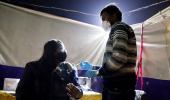The United Kingdom health authorities on Friday said they will be conducting further analysis into a sub-lineage of the Omicron variant of COVID-19 after designating it a variant under investigation (VUI).

The UK Health Security Agency (UKHSA), which monitors data related to the pandemic, said the sub-lineage known as BA.2 shows a low number of cases in the country, with the original Omicron lineage BA.1 still dominant.
A VUI designation is the initial step of investigation before being designated a variant of concern (VOC), which the original Omicron BA.1 currently is.
'The Omicron variant sub-lineage known as BA.2 has been designated as a variant under investigation,' UKHSA said.
'The number of BA.2 cases is currently low, with the original Omicron lineage, BA.1, still dominant in the UK and further analyses will now be undertaken. UKHSA are continuing to monitor data on the BA.2 sub-lineage closely,' it said.
The sub-lineage was designated in early December last year and as of January 10 this year, 53 sequences of BA.2 had been identified in the UK.
"It is in the nature of viruses to evolve and mutate, so it's to be expected that we will continue to see new variants emerge as the pandemic goes on," said Dr Meera Chand, UKHSA Incident Director.
"Our continued genomic surveillance allows us to detect them and assess whether they are significant. Case rates remain high throughout the UK and we must remain vigilant and take up vaccinations," she said.
The UKHSA update comes as the UK recorded another 107,364 COVID-19 infections on Thursday, after having dropped below the 100,000 mark in recent days.
The health agency said there is now 'high confidence' that the Omicron variant causes low severity of disease in adults.
However, confidence levels for severity indicators for children are low because further analysis is required to compare the risk of hospitalisation between Omicron and Delta, and to assess the clinical nature of illness in children.
"We'll be undertaking further analysis to investigate the small rise in the number of children admitted to hospital but currently coronavirus (COVID-19) poses a very low health risk to children and infants," said Dr Susan Hopkins, UKHSA Chief Medical Advisor.
"Early data shows that young children who are hospitalised experience mild illness and are discharged after short stays in hospital. Getting your booster jab remains the most effective way of protecting yourself and others from infection and severe disease," she said, adding that testing remains an important tool in the fight against COVID.
Earlier this week, British Prime Minister Boris Johnson announced a roll back of strict COVID-19 restrictions, as the so-called Plan B measures brought in to tackle Omicron will be allowed to lapse from next Thursday.
People will no longer be directed to work from home where possible or wear face masks as a legal mandate.
Larger venues will not be legally required to demand a COVID vaccine certificate or negative COVID test for entry, but can still choose to do so.
"As we return to Plan A, the House will know that some measures still remain, including those on self-isolation. In particular, it is still a legal requirement for those who have tested positive for COVID to self-isolate," Johnson told the Commons.
"This week the World Health Organisation said that while the global situation remains challenging, the United Kingdom can start to see 'light at the end of the tunnel'," he said.
The devolved regions of the United Kingdom have also eased strict household mixing norms as the pressure on hospitals is brought under control.










